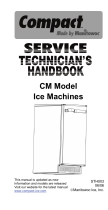
Section 1 General Information
Part Number 040002380 9/12 5
Do not operate equipment that has been misused, abused,
neglected, damaged, or altered/modified from that of original
manufactured specifications. This appliance is not intended
for use by persons (including children) with reduced physical,
sensory or mental capabilities, or lack of experience and
knowledge, unless they have been given supervision
concerning use of the appliance by a person responsible for
their safety. Do not allow children to play with this appliance.
All covers and access panels must be in place and
properly secured, before operating this equipment.
Do not obstruct machine vents or openings.
Do not store gasoline or other flammable vapors or liquids
in the vicinity of this or any other appliance.
Do not clean with water jet.
It is the responsibility of the equipment owner to perform
a Personal Protective Equipment Hazard Assessment to
ensure adequate protection during maintenance
procedures.
Some 50 hz models may contain up to 150 grams of R290
(propane) refrigerant. R290 (propane) is flammable in
concentrations of air between approximately 2.1% and 9.5%
by volume (LEL lower explosion limit and UEL upper
explosion limit). An ignition source at a temperature higher
than 470°C is needed for a combustion to occur. Refer to
nameplate to identify the type of refrigerant in your
equipment. Only trained and qualified personnel aware of the
dangers are allowed to work on the equipment.
When using electric appliances, basic precautions must
always be followed, including the following:
a. Read all the instructions before using the
appliance.
b. To reduce the risk of injury, close supervision is
necessary when an appliance is used near
children.
c. Do not contact moving parts.
d. Only use attachments recommended or sold by
the manufacturer.
e. Do not use outdoors.
f. For a cord-connected appliance, the following
must be included:
• Do not unplug by pulling on cord. To unplug,
grasp the plug, not the cord.
• Unplug from outlet when not in use and
before servicing or cleaning.
• Do not operate any appliance with a
damaged cord or plug, or after the appliance
malfunctions or is dropped or damaged in
any manner. Contact the nearest authorized
service facility for examination, repair, or
electrical or mechanical adjustment.
g. Follow applicable lock out tag out procedures
before working on equipment.
h. Connect to a properly grounded outlet only.
Objects placed or dropped in the bin can affect human
health and safety. Locate and remove any objects
immediately.
The Commonwealth of Massachusetts requires that
all water-cooled models must be connected only to a
closed loop, cooling tower system.





















